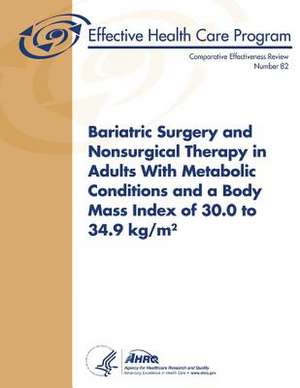Bariatric Surgery and Nonsurgical Therapy in Adults with Metabolic Conditions and a Body Mass Index of 30.0 to 34.9 Kg/M
Autor U. S. Department of Heal Human Services, Agency for Healthcare Resea And Qualityen Limba Engleză Paperback
Preț: 160.55 lei
Preț vechi: 169.00 lei
-5% Nou
Puncte Express: 241
Preț estimativ în valută:
30.73€ • 31.96$ • 25.71£
30.73€ • 31.96$ • 25.71£
Carte disponibilă
Livrare economică 21 februarie-07 martie
Preluare comenzi: 021 569.72.76
Specificații
ISBN-13: 9781491058640
ISBN-10: 1491058641
Pagini: 192
Dimensiuni: 216 x 280 x 10 mm
Greutate: 0.46 kg
Editura: CREATESPACE
ISBN-10: 1491058641
Pagini: 192
Dimensiuni: 216 x 280 x 10 mm
Greutate: 0.46 kg
Editura: CREATESPACE
